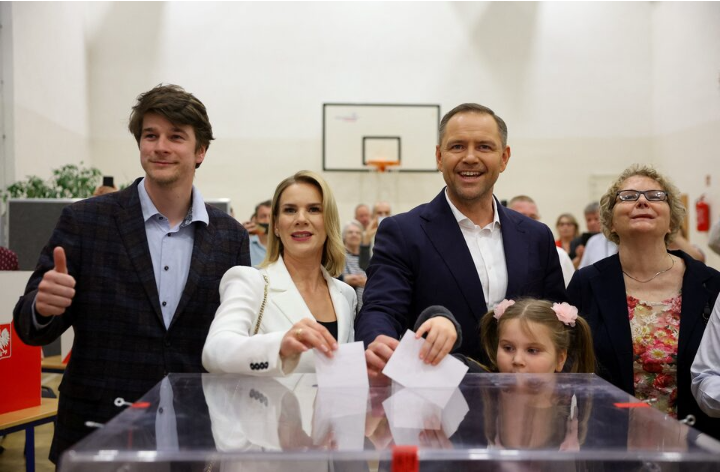Poles headed to the polls on Sunday in one of the most crucial presidential elections in recent memory, with the country split between two starkly different futures: deeper integration with the European Union or a shift toward nationalist, MAGA-style politics.
The race is neck-and-neck between Rafal Trzaskowski of the pro-EU Civic Coalition (KO) and Karol Nawrocki, the nationalist candidate backed by the Law and Justice (PiS) party. With opinion polls showing the gap well within the margin of error, the result could go either way. Final results are expected Monday.
While Poland’s parliament holds legislative power, the president can veto laws—making this election pivotal not just for domestic policy, but for Poland’s role on the international stage. The outcome is being closely monitored by global powers, including the United States, Russia, and neighboring Ukraine.
Both candidates support strong defense spending and continued aid to Ukraine in the wake of Russia’s ongoing invasion. However, their foreign policy strategies sharply diverge. Trzaskowski advocates for a strong alliance with both Brussels and Washington. Nawrocki, who recently met with Donald Trump in the U.S., leans heavily toward American relations and has raised doubts about supporting Ukraine’s bid to join NATO—fearing it could entangle Poland in war.
“This vote is about our identity as a country,” said Robert Kepczynski, a 53-year-old IT specialist voting in Warsaw. “Relying only on the U.S. is shortsighted. We need balance.”
Meanwhile, economist Maria Luczynska, 73, expressed the emotional weight of the moment. “It’s about the future my children and grandchildren will inherit.”
The outcome could also impact Poland’s fragile judicial reforms. Nawrocki is expected to block the pro-European government’s attempt to reverse controversial judicial changes implemented by PiS, which the EU has criticized for undermining the rule of law.
This election is the biggest political test yet for Prime Minister Donald Tusk’s broad coalition government, which took power 18 months ago. Trzaskowski is framing the vote as a decision on Poland’s place in Europe, while Nawrocki has painted it as a fight for traditional values against liberal elitism.

Social issues also divide the candidates. Trzaskowski supports liberalizing abortion laws and civil partnerships for LGBTQ+ couples. Nawrocki, leaning into Poland’s Catholic identity, staunchly opposes such reforms.
The first round of voting on May 18 showed rising support for the far-right, hinting at a shift in Poland’s political landscape. Yet, it’s the familiar KO vs PiS face-off once again. Nawrocki’s campaign has faced scandals, but his message continues to resonate in rural, conservative regions where PiS has deep support.
“These elections could be decided by a handful of votes,” Nawrocki warned at a rally. Trzaskowski, speaking in central Poland, urged, “Let’s make sure Poland leads in Europe, not stands on the sidelines.”
With polls closing at 9 p.m., and the final result due within 24 hours, all eyes are on Poland. The direction it chooses could redefine its future—for better or for worse.



